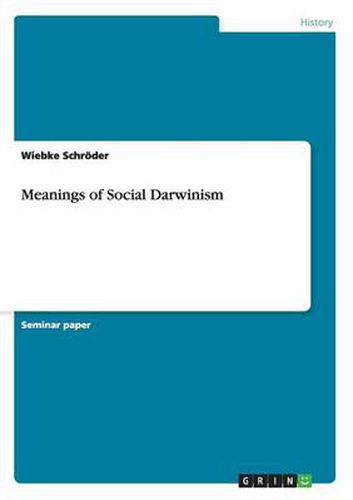Readings Newsletter
Become a Readings Member to make your shopping experience even easier.
Sign in or sign up for free!
You’re not far away from qualifying for FREE standard shipping within Australia
You’ve qualified for FREE standard shipping within Australia
The cart is loading…






Seminar paper from the year 2011 in the subject History - Miscellaneous, grade: A, Indiana University (History and Philosophy of Science), course: The Meanings of Darwinism, language: English, abstract: […] In this paper I want to show how one particular difference in defining social Darwinism affects the manner of telling history. Namely, the difference between social Darwinism as a world-view that is clearly independent of Darwin’s theory and social Darwinism as an application of Darwin’s theory in one way or the other. In the next section I explain why I use Hawkins as a representative of the latter version even though he claims to define social Darwinism independently of Darwin. After a short review of Hofstadter’s reasons for classifying Carnegie as a social Darwinist, I will analyze Carnegie’s essays in some depth. As the only historian who does not take Darwin’s theory as the basis for social Darwinism, I will then confront the analysis with Greene’s perspective. Finally I conclude with an answer to the question of historiographical relevance of defining social Darwinism one way or the other.
$9.00 standard shipping within Australia
FREE standard shipping within Australia for orders over $100.00
Express & International shipping calculated at checkout
Seminar paper from the year 2011 in the subject History - Miscellaneous, grade: A, Indiana University (History and Philosophy of Science), course: The Meanings of Darwinism, language: English, abstract: […] In this paper I want to show how one particular difference in defining social Darwinism affects the manner of telling history. Namely, the difference between social Darwinism as a world-view that is clearly independent of Darwin’s theory and social Darwinism as an application of Darwin’s theory in one way or the other. In the next section I explain why I use Hawkins as a representative of the latter version even though he claims to define social Darwinism independently of Darwin. After a short review of Hofstadter’s reasons for classifying Carnegie as a social Darwinist, I will analyze Carnegie’s essays in some depth. As the only historian who does not take Darwin’s theory as the basis for social Darwinism, I will then confront the analysis with Greene’s perspective. Finally I conclude with an answer to the question of historiographical relevance of defining social Darwinism one way or the other.